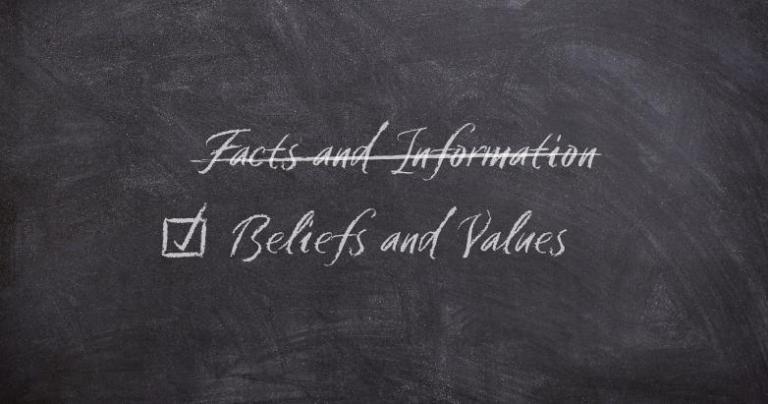
Six years ago, I began training as an interfaith minister because I wanted to understand how beliefs and values shaped humanity.
I was raised in a culturally Christian environment that was simultaneously spiritual but not religious. This mix of ideas broadened my mind considerably. Still, I did not understand how much religious and spiritual beliefs shaped people’s responses until I moved from Iceland to Texas in 2010 and had to acclimate to a different worldview, much of which was rooted in a brand of Christianity I had never seen before.
Through these experiences—and my study of work by Jonathan Haidt, Steven Pinker, Daniel Kahneman, Howard Gardner, and Padraig O’Malley—I’ve come to a conclusion that is both difficult to stomach and crucial to understand if we want to solve the world’s most pressing problems. Beliefs and values are more important to people than facts and information.
The Climate, Pandemic, and Guns
This is not an academic article, so I will refer you to the work of the academics listed above if you are looking for proof. However, I want to present three examples that support my point of view.
- The climate crisis.
- The pandemic.
- The gun debate in America.
I’ve been a part of the climate movement since the mid-nineties and know from considerable experience that information will only move a small percentage of people to act. It has been an exasperating experience to offer abundant scientific evidence only to be countered with vague value and belief statements.
The same is true about the COVID-19 pandemic. Although I admit the science was evolving and needed some interpretation, people quickly moved into ideological camps, content with being guided by beliefs and values alone.
And most heartbreakingly, I helplessly watched children gunned down in a senseless mass shooting in Uvalde earlier this year. Like so many others, I want to solve this problem, but I’ve lived in Texas for twelve years and have come to understand that ‘the gun’ is a rich symbol firmly embedded in people’s beliefs. Because those beliefs run so deep, it is near impossible to have sensible conversations about gun safety.
What Can Be Done?
These are examples of three pressing problems. They are not new. In fact, we seem no closer to solving now than we were ten, twenty, or even thirty years ago.
Granted, I don’t have all the answers, but I know what doesn’t work because I’ve seen it not work for decades. Presenting people with more information will not change their minds. Nor will calling them names or making fun of their beliefs.
So, what can be done?
The science of changing minds is complex, but, as with all interfaith encounters, the first step is probably to take people’s beliefs seriously. Yes, even the ones we disagree with (especially those).
To find solutions, we need to understand what drives people’s behavior. Jonathan Haidt points out that humans are more emotional and tribal in their decision-making than they like to believe. People who don’t get that will keep trying to apply solutions that don’t work, such as intellectual reasoning, to counter emotional beliefs and values.
People Listen to People Who…
Furthermore, we should be mindful of an important lesson learned in the interfaith community. People listen to people who are like them. This means that those who will not listen to you will likely listen to a friend, a pastor, a guru, an academic, or someone they like and respect. Trying to get millions of people to change their minds is impossible. Creating relationships with leaders and influencers who already have access to those people is much more achievable.
Too Far Gone?
I want to cling to hope. It is a natural human instinct. Still, I am also a realist who has a Twitter account. I see how people’s beliefs and values give them cover to demonize those who have opposing beliefs. It’s a disturbing and devolving spiral. Having witnessed one tragedy after another in the past few years, I keep telling myself: “This is enough. This will get people to change their behavior. This will help us move to the middle and look for solutions that most can agree on.” It hasn’t happened yet, but I haven’t given up on hope.
We Can At Least
In this article, I’ve been attempting to make two crucial points.
- One, people’s beliefs and values drive their behavior.
- Two, no one responds well when their beliefs and values are under attack.
In my mind, the first step toward a solution is to stop the name-calling and belittling of others, especially during times of heightened emotions.
Second, we should get curious about other people’s beliefs, especially ones we disagree with. This is the essence of interfaith work and can be applied in a broader context.
Third, if they are willing to talk to us, we should try to befriend those who influence people we disagree with. It can’t be done purely to get them to change their minds. We’d need to approach this task with curiosity and a willingness to find solutions.
Begin By Thinking Differently
Hopefully, this short article gets you to think differently about why people do what they do and why more information will not change beliefs. The sooner we accept that beliefs and values drive most human behavior, the better we can communicate with each other.
Gudjon Bergmann
Author and Mindfulness Teacher
Amazon Author Profile
Recommended books:
- Monk of All Faiths: Inspired by The Prophet (fiction)
- Spiritual in My Own Way (memoir)
- Co-Human Harmony: Using Our Shared Humanity to Bridge Divides (nonfiction)
- Experifaith: At the Heart of Every Religion (nonfiction)
- Premature Holiness: Five Weeks at the Ashram (novel)
- The Meditating Psychiatrist Who Tried to Kill Himself (novel)
Picture: CC0 License












